Thomas James Richards, Diaries, Transcript Vol. 2 - Part 17
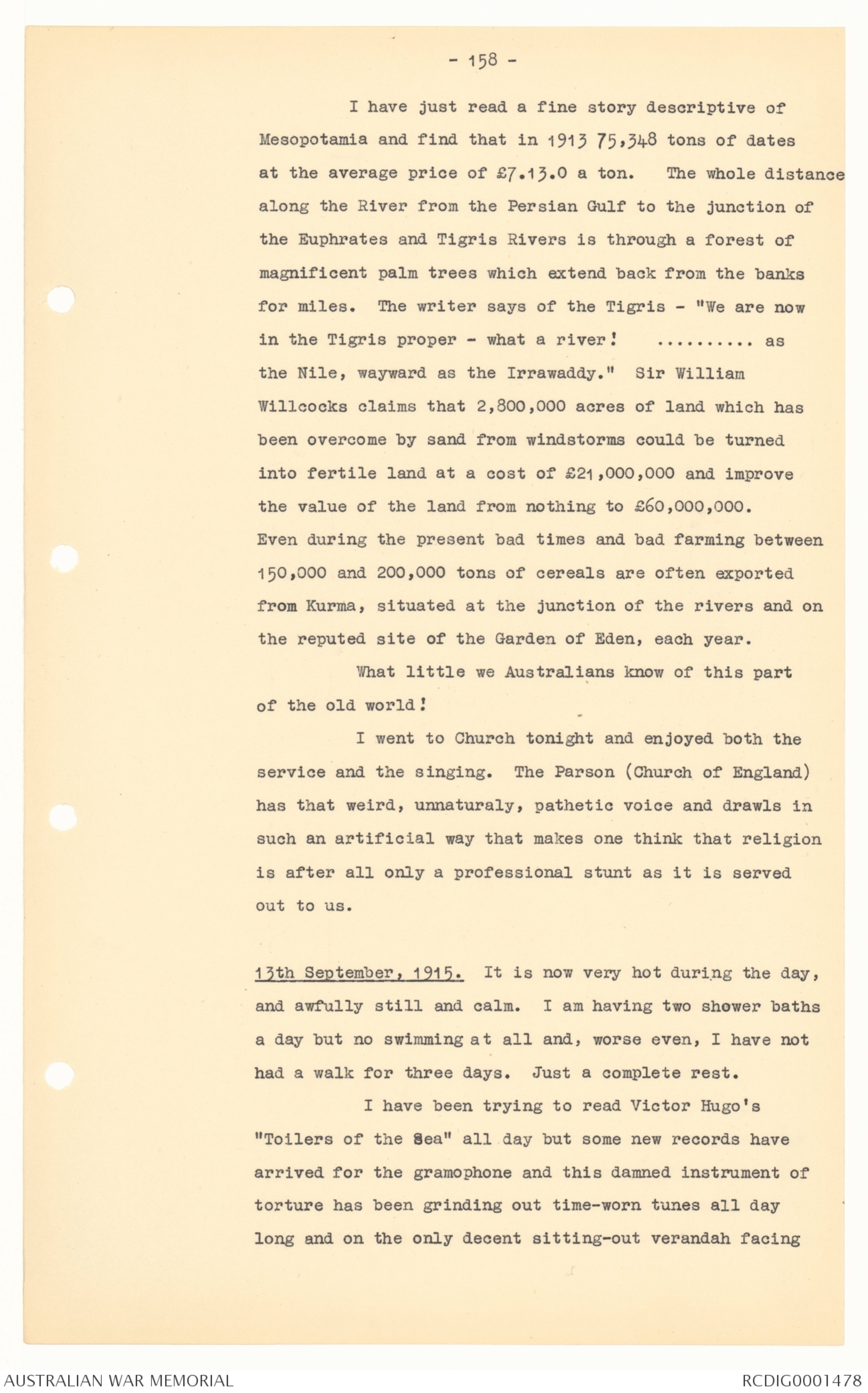
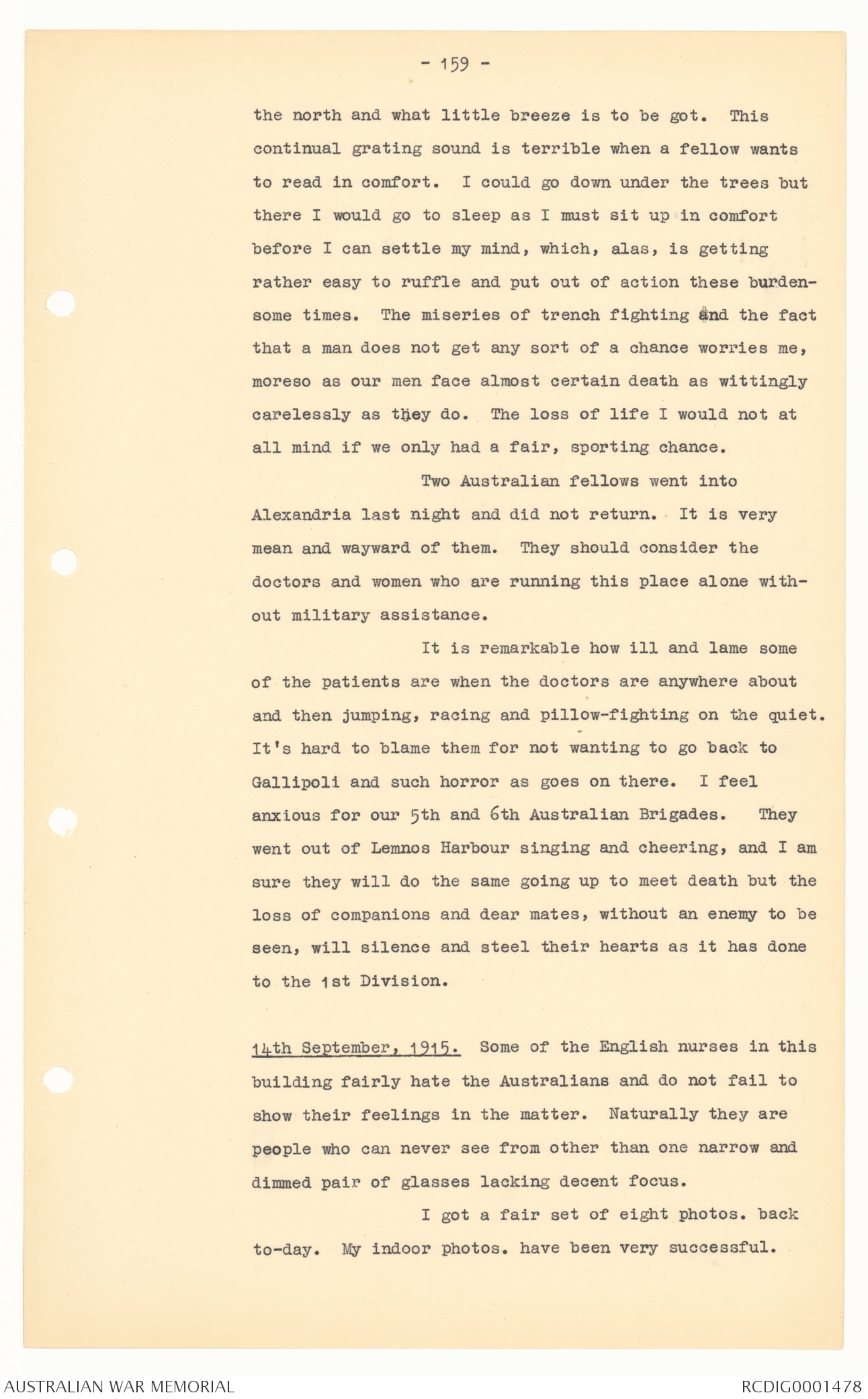
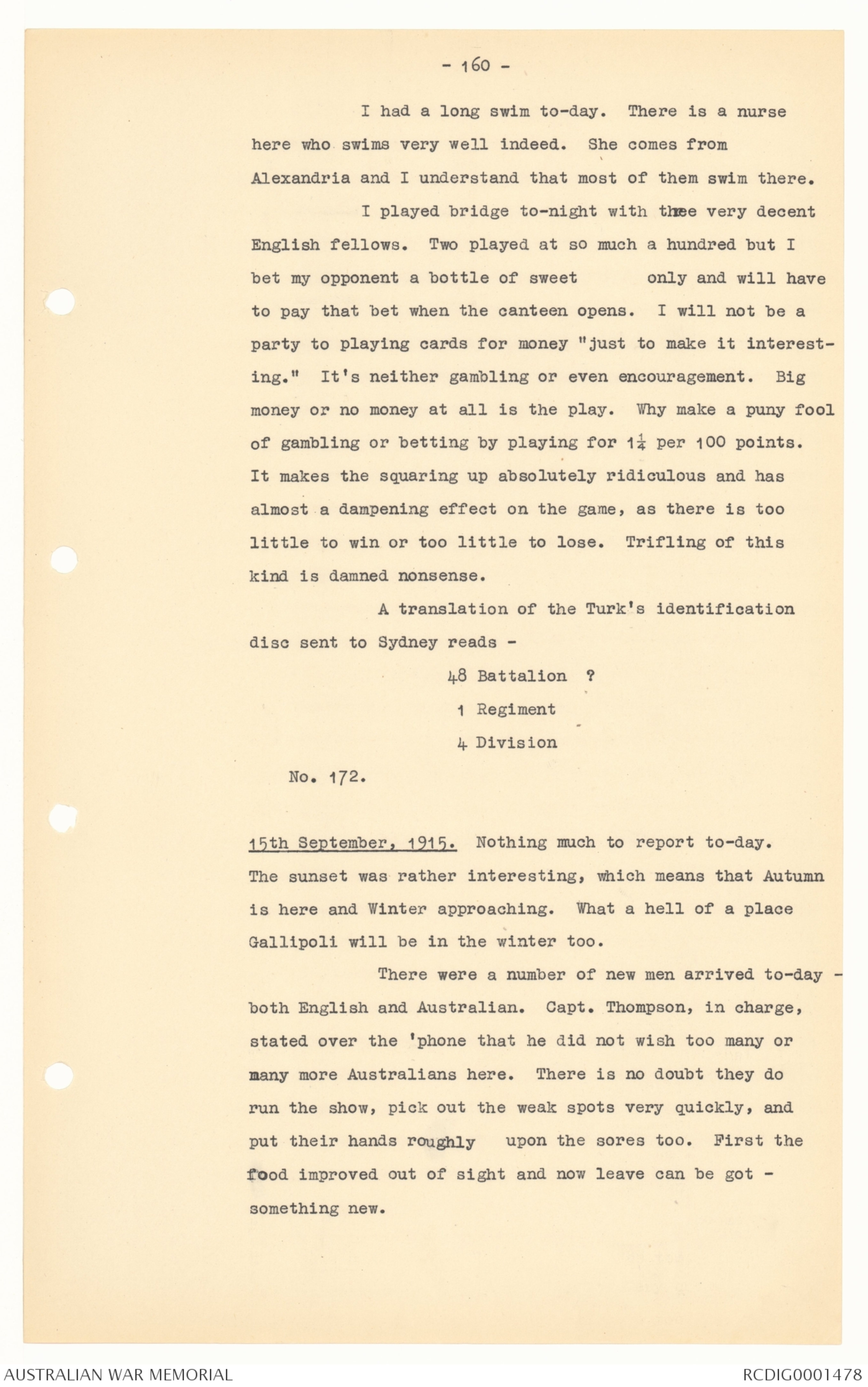
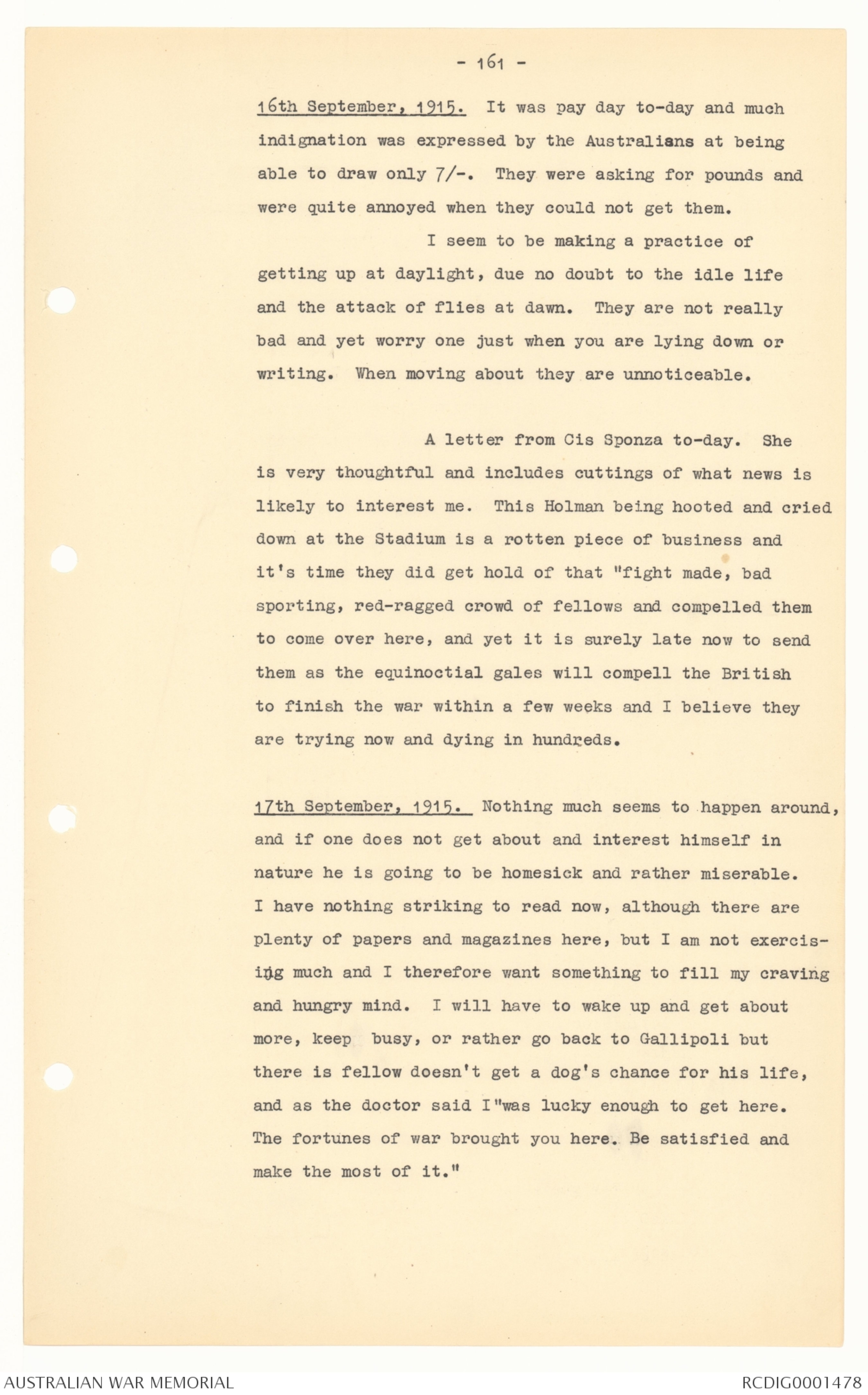
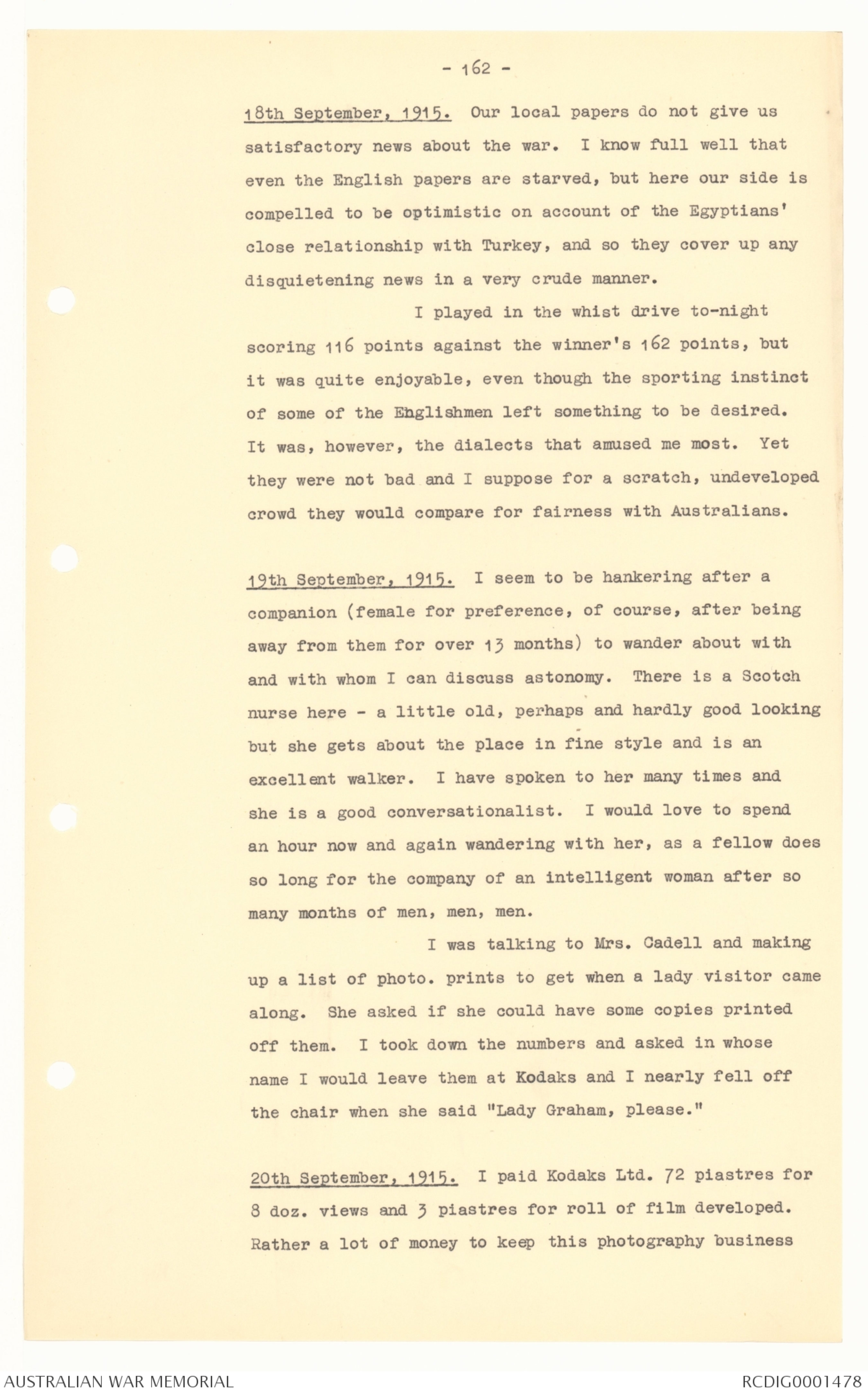
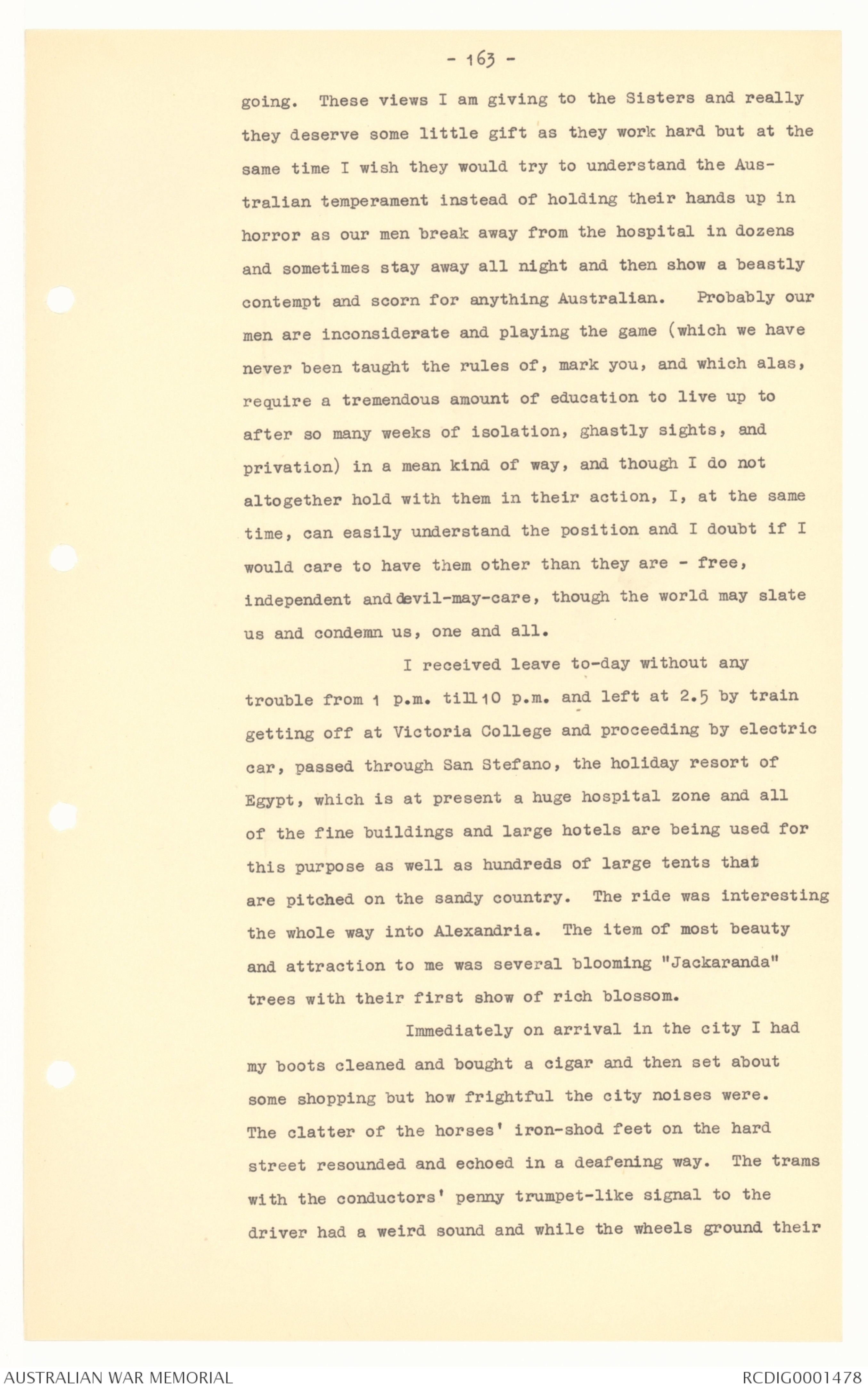
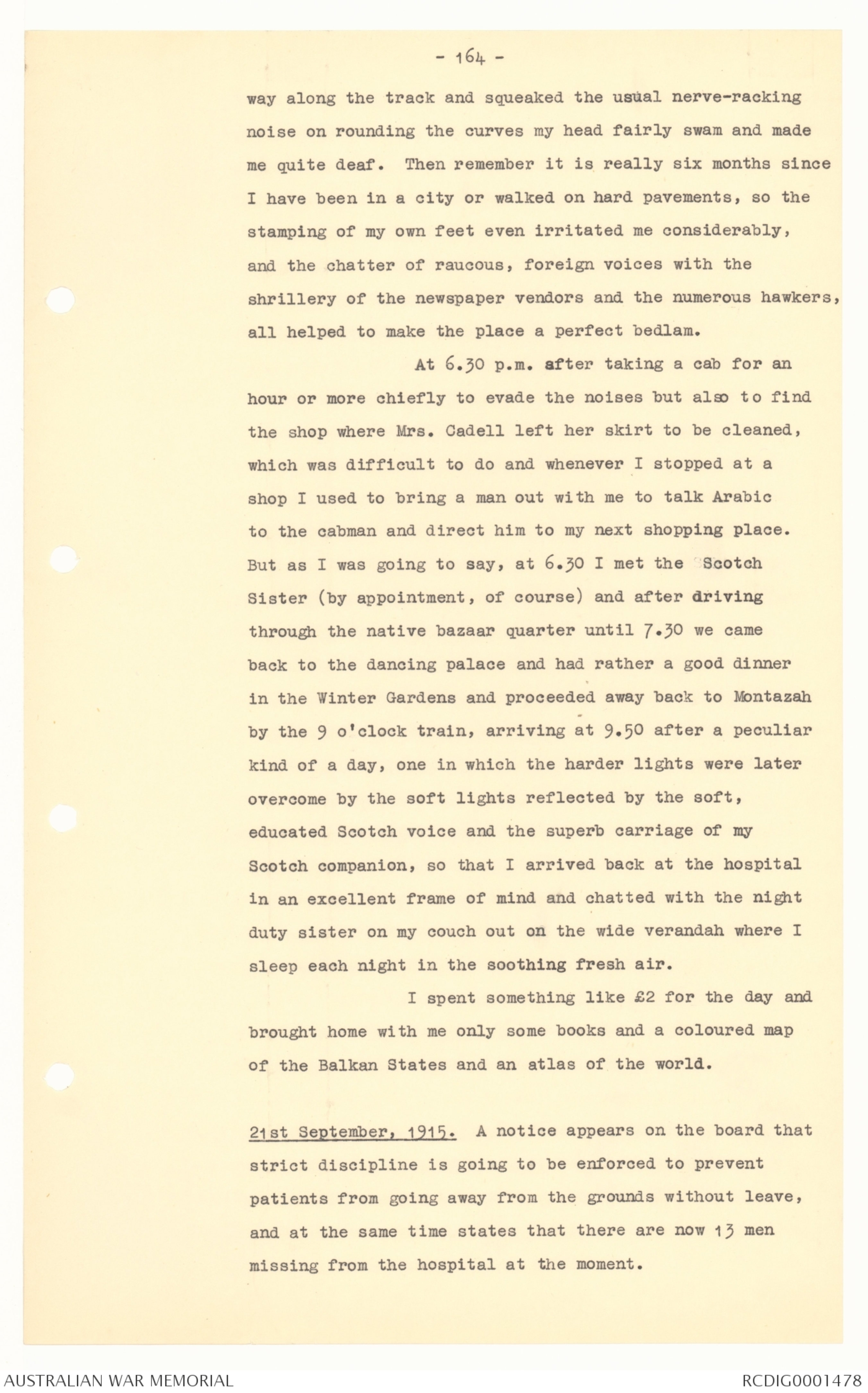
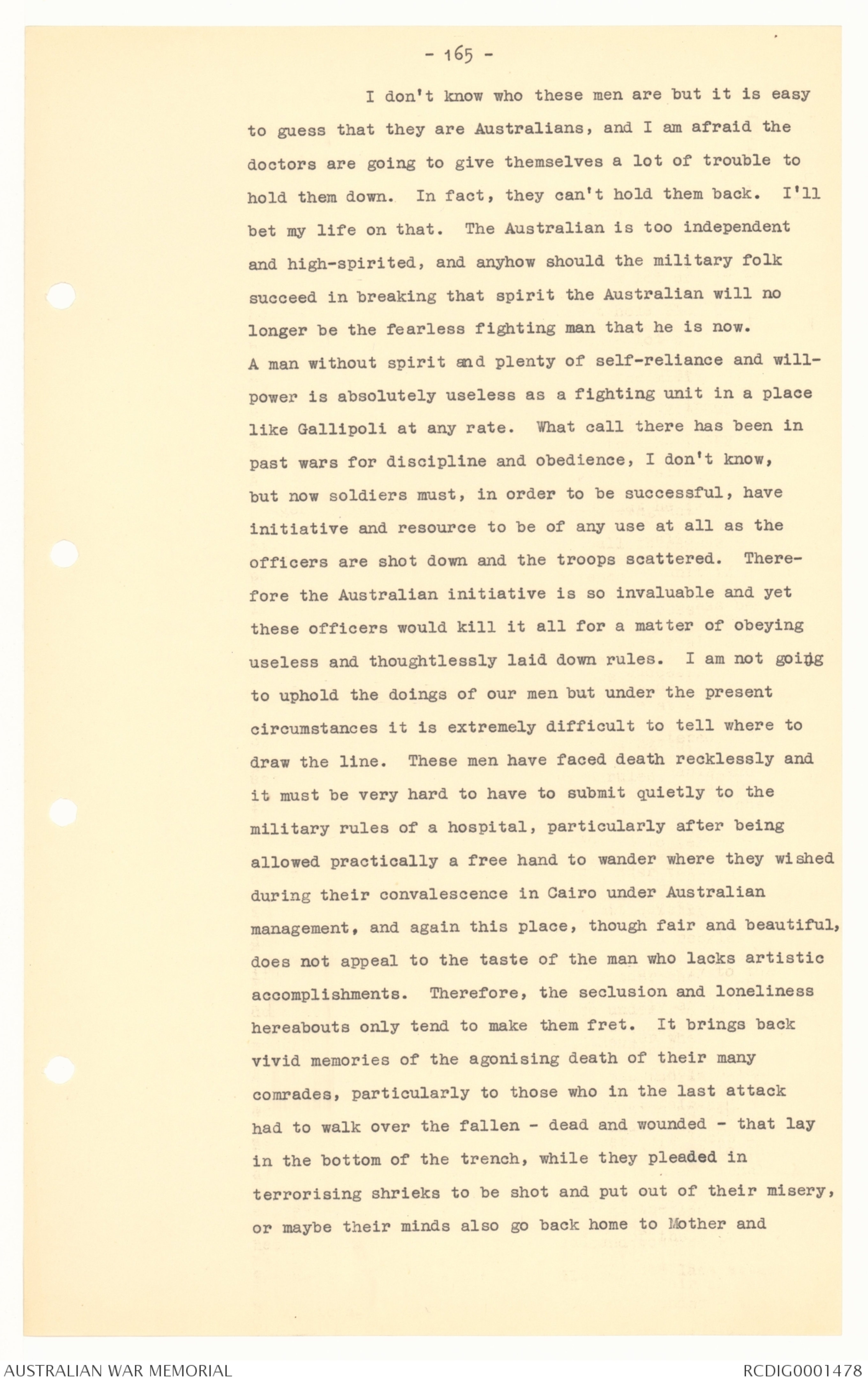
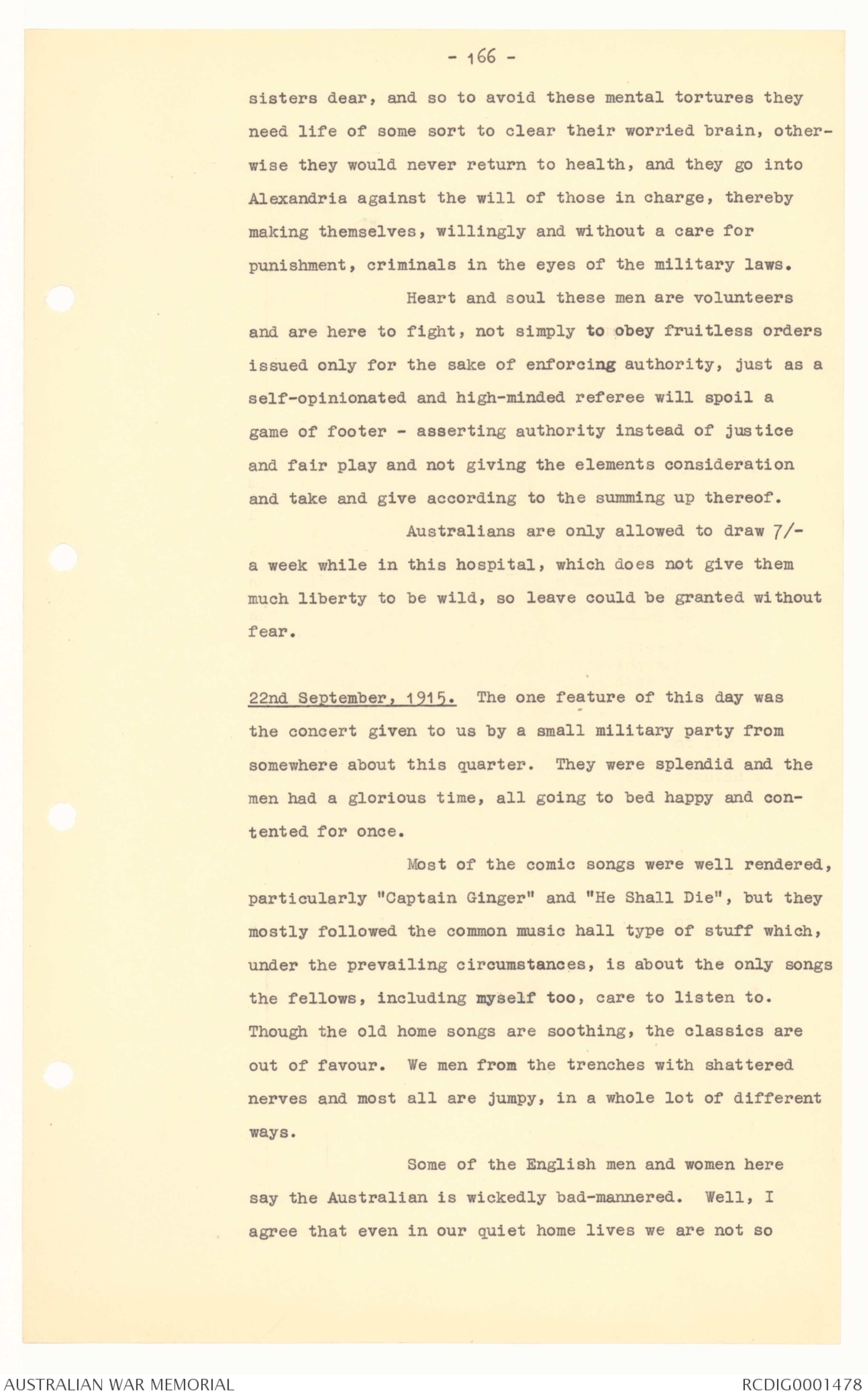
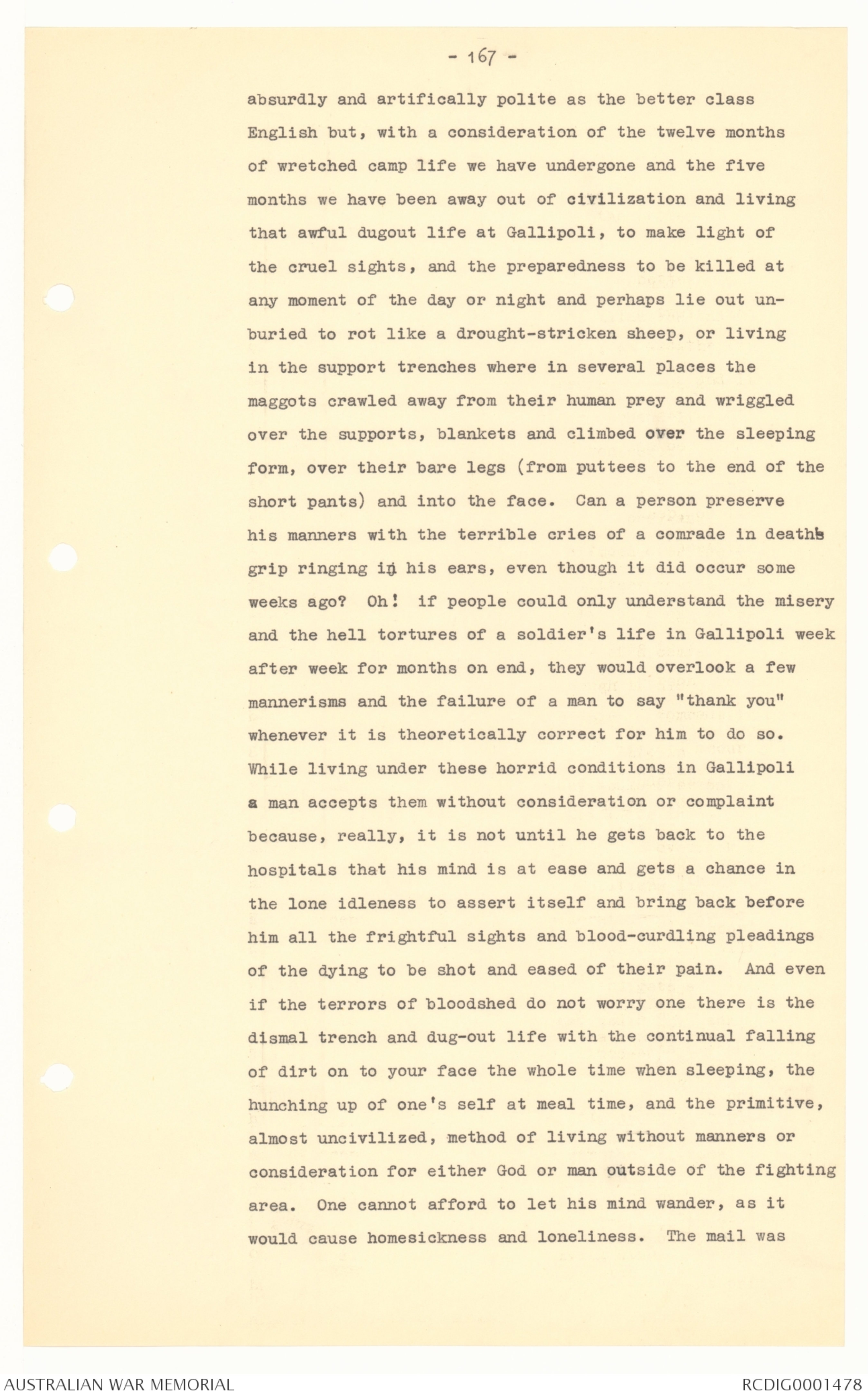
- 158 -
I have just read a fine story descriptive of
Mesopotamia and find that in 1913 75,348 tons of dates
at the average price of £7.13.0 a ton. The whole distance
along the River from the Persian Gulf to the junction of
the Euphrates and Tigris Rivers is through a forest of
magnificent palm trees which extend back from the banks
for miles. The writer says of the Tigris - "We are now
in the Tigris proper - what a river! .......... as
the Nile, wayward as the Irrawaddy." Sir William
Willcocks claims that 2,800,000 acres of land which has
been overcome by sand from windstorms could be turned
into fertile land at a cost of £21,000,000 and improve
the value of the land from nothing to £60,000,000.
Even during the present bad times and bad farming between
150,000 and 200,000 tons of cereals are often exported
from Kurma, situated at the junction of the rivers and on
the reputed site of the Garden of Eden, each year.
What little we Australians know of this part
of the world!
I went to Church tonight and enjoyed both the
service and the singing. The Parson (Church of England)
has that weird, unnaturaly, pathetic voice and drawls in
such an artificial way that makes me think that religion
is after all only a professional stunt as it is served
out to us.
13th September, 1915. It is now very hot during the day,
and awfully still and calm. I am having two shower baths
a day but no swimming at all and, worse even, I have not
had a walk for three days. Just a complete rest.
I have been trying to read Victor Hugo's
"Toilers of the Sea" all day but some new records have
arrived for the gramophone and this damned instrument of
torture has been grinding out time-worn tunes all day
long and on the only decent sitting-out verandah facing
- 159 -
the north and what little breeze is to be got. This
continual grating sound is terrible when a fellow wants
to read in comfort. I could go down under the trees but
there I would go to sleep as I must sit up in comfort
before I can settle my mind, which, alas, is getting
rather easy to ruffle and put out of action these burdensome
times. The miseries of trench fighting and the fact
that a man does not get any sort of a chance worries me,
moreso as our men face almost certain death as wittingly
carelessly as they do. The loss of life I would not at
all mind if we only had a fair, sporting chance.
Two Australian fellows went into
Alexandria last night and did not return. It is very
mean and wayward of them. They should consider the
doctors and women who are running this place alone without
military assistance
It is remarkable how ill and lame some
of the patients are when the doctors are anywhere about
and then jumping, racing and pillow-fighting on the quiet.
It's hard to blame them for not wanting to go back to
Gallipoli and such horror as goes on there. I feel
anxious for our 5th and 6th Australian Brigades. They
went out of Lemnos Harbour singing and cheering, and I am
sure they will do the same going up to meet death but the
loss of companions and dear mates, without an enemy to be
seen, will silence and steel their hearts as it has done
to the 1st Division.
14 September, 1915. Some of the English nurses in this
building fairly hate the Australians and do not fail to
show their feelings in the matter. Naturally they are
people who can never see from other than one narrow and
dimmed pair of glasses lacking decent focus.
I got a fair set of eight photos. back
to-day. My indoor photos. have been very successful.
- 160 -
I had a swim to-day. There is a nurse
here who swims very well indeed. She comes from
Alexandria and I understand that most of them swim there.
I played bridge to-night with three very decent
English fellows. Two played at so much a hundred but I
bet my opponent a bottle of sweet only and will have
to pay that bet when the canteen opens. I will not be a
party to playing cards for money "just to make it interesting."
It's neither gambling or even encouragement. Big
money or no money at all is the play. Why make a puny fool
of gambling or betting by playing for 1¼ per hundred points.
It makes the squaring up absolutely ridiculous and has
almost a dampening effect on the game, as there is too
little to win or too little to lose. Trifling of this
kind of damned nonsense.
A translation of the Turk's identification
disc sent to Sydney reads -
48 Battalion ?
1 Regiment
4 Division
No. 172.
15th September, 1915. Nothing much to report to-day.
The sunset was rather interesting, which means that Autumn
is here and Winter approaching. What a hell of a place
Gallipoli will be in the winter too.
There were a number of new men arrived to-day -
both English and Australian. Capt. Thompson, in charge,
stated over the 'phone that he did not wish too many or
many more Australians here. There is no doubt they do
run the show, pick out the weak spots very quickly, and
put their hands roughly upon the sores too. First the
food improved out of sight and now leave can be got -
something new.
- 161 -
16th September, 1915. It was pay day to-day and much
indignation was expressed by the Australians at being
able to draw only 7/-. They were asking for pounds and
were quite annoyed when they could not get them.
I seem to making a practice of
getting up at daylight, due no doubt to the idle life
and the attack of flies at dawn. They are not really
bad and yet worry one just when you are lying down or
writing. When moving about they are unnoticeable.
A letter from Cis Sponza to-day. She
is very thoughtful and includes cuttings of what news is
likely to interest me. This Holman being hooted and cried
down at the Stadium is a rotten piece of business and
it's time they did get hold of the "fight made, bad
sporting, red-ragged crowd of fellows and compelled them
to come over here, and yet it is surely late now to send
them as equinoctial gales will compell the British
to finish the way within a few weeks and I believe they
are trying now and dying in hundreds.
17th September, 1915. Nothing much seems to happen around,
and if one does not get about and interest himself in
nature he is going to be homesick and rather miserable.
I have nothing striking to read now, although there are
plenty of papers and magazines here, but I am not exercising
much and I therefore want something to fill my craving
and hungry mind. I will have to wake up and get about
more, keep busy, or rather go back to Gallipoli but
there is fellow doesn't get a dogs chance for his life,
and as the doctor said I "was lucky enough to get here.
The fortunes of war brought you here. Be satisfied and
make the most of it."
- 162 -
18th September, 1915. Our local papers do not give us
satisfactory news about the war. I know full well that
even the English papers are starved, but here our side is
compelled to be optimistic on account of the Egyptians'
close relationship with Turkey, and so they cover up any
disquietening news in a very crude manner.
I played in the Whist drive to-night
scoring 116 points against the winner's 162 points, but
it was quite enjoyable, even though the sporting instinct
of some of the Englishmen left something to be desired.
It was, however, the dialects that amused me most. Yet
they were not bad and I suppose for a scratch, undeveloped
crowd they would compare for fairness with Australians.
19th September, 1915. I seem to be hankering after a
companion (female for preference, of course, after being
away from them for over 13 months) to wander about with
and with whom I can discuss astonomy. There is a Scotch
nurse here - a little old, perhaps and hardly good looking
but she gets about the place in fine style and is an
excellent walker. I have spoken to her many times and
she is a good conversationalist. I would love to spend
an hour now and again wandering with her, as a fellow does
so long for the company of an intelligent woman after so
many months of men, men, men.
I was talking to Mrs. Cadell and making
up a list of photo. prints to get when a lady visitor came
along. She asked if she could have some copies printed
off them. I took down the numbers and asked in whose
name I would leave them at Kodaks and I nearly fell off
the chair when she said "Lady Graham, please."
30th September, 1915. I paid Kodaks Ltd. 72 piastres for
8 doz. views and 3 piastres for roll of film developed.
Rather a lot of money to keep this photography business
- 163 -
going. These views I am giving to the Sisters and really
they deserve some little gift as they work hard but at the
same time I wish they would try to understand the
Australian temperament instead of holding their hands up in
horror as our men break away from the hospital in dozens
and sometimes stay away all night and then show a beastly
contempt and scorn for anything Australian. Probably our
men are inconsiderate and playing the game (which we have
never been taught the rules of, mark you, and which alas,
require a tremendous amount of education to live up to
after so many weeks of isolation, ghastly sights, and
privation) in a mean kind of way, and though I do not
altogether hold with them in their action, I, at the same
time, can easily understand the position and I doubt if I
would care to have them other than they are - free,
independent and devil-may-care, though the world may slate
us and condemn us, one and all.
I received leave to-day without any
trouble from 1 p.m. till 10 p.m. and left at 2.5 by train
getting off at Victoria College and proceeding by electric
car, passed through San Stefano, the holiday resort of
Egypt, which is at present a huge hospital zone and all
of the fine buildings and large hotels are being used for
this purpose as well as hundreds of large tents that
are pitched on the sandy country. The ride was interesting
the whole way into Alexandria. The item of most beauty
and attraction to me was several blooming "Jackaranda"
trees with their first show of rich blossom.
Immediately on arrival in the city I had
my boots cleaned and bought a cigar and then set about
some shopping but how frightful the city noises were.
The clatter of the horses' iron-shod feet on the hard
street resounded and echoed in a deafening way. The trams
with the conductors' penny trumpet-like signal to the
driver had a weird sound and while the wheels ground their
- 164 -
way along the track and squeaked the usual nerve-racking
noise on rounding the curves my head fairly swam and made
me quite deaf. Then remember it is really six months since
I have been in a city or walked on hard pavements, so the
stamping of my own feet even irritated me considerably,
and the chatter of raucous, foreign voices with the
shrillery of the newspaper vendors and the numerous hawkers,
all helped to make the place a perfect bedlam.
At 6.30 p.m. after taking a cab for an
hour or more chiefly to evade the noises but also to find
the shop where Mrs. Cadell left her skirt to be cleaned,
which was difficult to do and whenever I stopped at a
shop I used to bring a man out with me to talk Arabic
to the cabman and direct him to my next shopping place.
But as I was going to say, at 6.30 I met the Scotch
Sister (by appointment, of course) and after driving
through the native bazaar quarter until 7.30 we came
back to the dancing palace and had rather a good dinner
in the Winter Gardens and proceeded away back to Montazah
by the 9 o'clock train, arriving at 9.50 after a peculiar
kind of day, one in which the harder lights were later
overcome by the soft lights reflected by the soft,
educated Scotch voice and the superb carriage of my
Scotch companion, so that I arrived back at the hospital
in an excellent frame of mind and chatted with the night
duty sister on my couch out on the wide verandah where I
sleep each night in the soothing fresh air.
I spent something like £2 for the day and
brought home with only some books and a coloured map
of the Balkan States and an atlas of the world.
21st September, 1915. A notice appears on the board that
strict discipline is going to be enforced to prevent
patients from going away from the grounds without leave,
and at the same time states that there a now 13 men
missing from the hospital at the moment.
- 165 -
I don't know who these men are but it is easy
to guess that they are Australians, and I am afraid the
doctors are going to give themselves a lot of trouble to
hold them down. In fact, they can't hold them back. I'll
bet my life on that. The Australian is too independent
and high-spirited, and anyhow should the military folk
succeed in breaking that spirit the Australian will no
longer be the fearless fighting man that he is now.
A man without spirit and plenty of self-reliance and
willpower is absolutely useless as a fighting unit in a place
like Gallipoli at any rate. What call there has been in
past wars for discipline and obedience, I don't know,
but now soldiers must, in order to be successful, have
initiative and resource to be of any use at all as the
officers are shot down and the troops scattered. Therefore
the Australian initiative is so invaluable and yet
these officers would kill it all for a matter of obeying
useless and thoughtlessly laid down rules. I am not going
to uphold the doings of our men but under the present
circumstances it is extremely difficult to tell where to
draw the line. These men have faced death recklessly and
it must be very hard to have to submit quietly to the
military rules of a hospital, particularly after being
allowed practically a free hand to wander where they wished
during their convalescence in Cairo under Australian
management, and again this place, though fair and beautiful,
does not appeal to the taste of the man who lacks artistic
accomplishments. Therefore, the seclusion and loneliness
hereabouts only tend to make them fret. It brings back
vivid memories of the agonising death of their many
comrades, particularly to those who in the last attack
had to walk over the fallen - dead and wounded - that lay
in the bottom of the trench, while they pleaded in
terrorising shrieks to be shot and put out of their misery,
or maybe their minds also go back home to Mother and
- 166 -
sisters dear, and so to avoid these mental tortures they
need life of some sort to clear their worried brain, otherwise
they would never return to health, and they go into
Alexandria against the will of those in charge, thereby
making themselves, willingly and without a care for
punishment, criminals in the eyes of military laws.
Heart and soul these men are volunteers
and are here to fight, not simply to obey fruitless orders
issued only for the sake of enforcing authority, just as a
self-opinionated and high-minded referee will spoil a
game of footer - asserting authority instead of justice
and fair play and not giving the elements consideration
and take and give according to the summing up thereof.
Australians are only allowed to draw 7/-
a week while in this hospital, which does not give them
much liberty to be wild, so leave could be granted without
fear.
22nd September, 1915. The one feature of this day was
the concert given to us by a small military party from
somewhere about this quarter. They were splendid and the
men had a glorious time, all going to bed happy and
contented for once.
Most of the comic songs were well rendered,
particularly "Captain Ginger" and "He Shall Die", but they
mostly followed common music hall type of stuff which,
under the prevailing circumstances, is about the only songs
the fellows, including myself too, care to listen to.
Though the old home songs are soothing, the classics are
out of favour. We men from the trenches with shattered
nerves and most all are jumpy, in a whole lot of different
ways.
Some of the English men and women here
say the Australian is wickedly bad-mannered. Well, I
agree that even in our quiet home lives we are not so
- 167 -
absurdly and artifically polite as the better class
English but, with a consideration of twelve months
of wretched camp life we have undergone and the five
months we have been away out of civilization and living
that awful dugout life at Gallipoli, to make light of
the cruel sights, and the preparedness to be killed at
any moment of the day or night and perhaps lie out
unburied to rot like a drought-stricken sheep, or living
in the support trenches where in several places the
maggots crawled away from their human prey and wriggled
over the supports, blankets and climbed over the sleeping
form, over their bare legs (from puttees to the end of the
short pants) and into the face. Can a person preserve
his manners with the terrible cries of a comrade in death's
grip ringing in his ears, even though it did occur some
weeks ago? Oh! if people could only understand the misery
and the hell tortures of a soldier's life in Gallipoli week
after week for months on end, they would overlook a few
mannerisms and the failure of a man to say "thank you"
whenever it is theoretically correct for him to do so.
While living under these horrid conditions in Gallipoli
a man accepts them without consideration or complaint
because, really, it is not until he gets back to the
hospitals that his mind is at ease and gets a chance in
the lone idleness to assert itself and bring back before
him all the frightful sights and blood-curdling pleadings
of the dying to be shot and eased of their pain. And even
if the terrors of bloodshed do not worry one there is the
dismal trench and dug-out life with the continual falling
of dirt on to your face the whole time sleeping, the
hunching up of one's self at meal time, and the primitive,
almost uncivilized, method of living without manners or
consideration for either God or man outside of the fighting
area. One cannot afford to let his mind wander, as it
would cause homesickness and loneliness. The mail was
 Sam scott
Sam scottThis transcription item is now locked to you for editing. To release the lock either Save your changes or Cancel.
This lock will be automatically released after 60 minutes of inactivity.